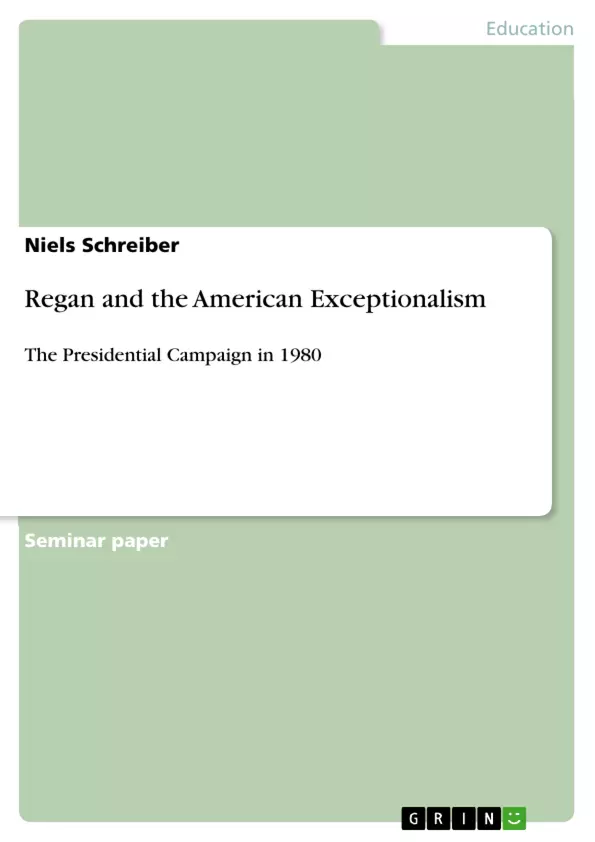In the course “Elections and Inaugurations” we talked about the current presidency and about past presidencies. During that I came across Ronald Reagan´s landslide election of 489 votes to 49.
Reagan was born in 1911 and during college he majored in economics. After college he became an actor. He started his political career in 1962 when he joint the Republican Party and got elected governor of California in 1966. Ronald Reagan stayed in office for 8 years until 1974, when he announced that he would not run again for governor, for he wanted to become the presidential candidate in 1976 for the Republicans. Unfortunately he lost the primaries to Gerald Ford, who went on to lose the election against Jimmy Carter. Four Years later in 1980 Reagan became the candidate for the Republicans and later on became the 40th president of the United States. At this point of time ( 1970s) the American situation was not so well. America faced economic problems, inflation, unemployment, the on going `Cold War´and a hostage situation in Iran, where the American embassy were being held hostage during the presidential campaigns between Carter and Reagan.
In this term paper I will look at the Reagan campaign and I will try to show that his campaign is deeply connected with the concept of ´American exceptionalism´. My thesis is that Reagan based his campaign on this concept and connected his promises and solutions to this concept. In order to prove my thesis, I will firstly explain the concept of ´American exceptionalism´in the first chapter and then I will summarize Reagan´s campaign in chapter two. After that I will try to show, and with that prove my thesis, how Reagan connected his campaign with the concept of ´American exceptionalism´ with regards to content and linguistically. In the conclusion my findings will be summarized and my thesis will be confirmed or rejected.
Inhaltsverzeichnis (Table of Contents)
- Introduction
- Main part
- Concept of "American exceptionalism"
- Reagan's Campaign
- Reagan's campaign and the “American exceptionalism”
- Conclusion
Zielsetzung und Themenschwerpunkte (Objectives and Key Themes)
This term paper aims to examine Ronald Reagan's 1980 presidential campaign and analyze its connection to the concept of 'American exceptionalism'. The paper argues that Reagan's campaign strategy was deeply rooted in this ideology and that he utilized it to shape his promises and proposed solutions.
- The concept of 'American exceptionalism' and its historical context
- Key elements of Reagan's campaign platform and his proposed solutions
- The connection between Reagan's campaign and 'American exceptionalism' in terms of content and language
- The role of 'American exceptionalism' in shaping Reagan's political rhetoric
- The impact of 'American exceptionalism' on Reagan's campaign strategy and his success
Zusammenfassung der Kapitel (Chapter Summaries)
The first chapter provides an in-depth analysis of the concept of 'American exceptionalism', exploring its origins, core values, and its evolution over time. It examines the belief in American exceptionalism and its implications for the nation's identity and foreign policy.
The second chapter focuses on Ronald Reagan's 1980 presidential campaign, outlining his key policies and promises. It examines his proposals for economic recovery, social welfare, gun control, and national security, and explores the context of the American political landscape at the time.
The third chapter aims to demonstrate the connection between Reagan's campaign and the concept of 'American exceptionalism'. It analyzes his campaign rhetoric and policy positions to identify how he utilized the ideology of 'American exceptionalism' to appeal to voters and advance his political agenda.
Schlüsselwörter (Keywords)
This term paper revolves around the keywords 'American exceptionalism', 'Ronald Reagan', 'presidential campaign', '1980 election', 'political rhetoric', 'campaign strategy', 'ideology', 'economic policy', 'social welfare', 'gun control', 'national security', 'Cold War', 'Iran hostage crisis', 'American identity', 'national destiny', 'political history', and 'United States'.
Frequently Asked Questions
What is the core concept of American exceptionalism?
American exceptionalism is the belief that the United States is inherently different from and superior to other nations due to its history, political institutions, and commitment to liberty and democracy.
How did Ronald Reagan use this concept in his 1980 campaign?
Reagan connected his promises of economic recovery and national strength to the idea of America's unique destiny, framing his policies as a return to the country's fundamental values and greatness.
What were the major challenges facing America in the late 1970s?
The U.S. faced high inflation, unemployment, the ongoing Cold War, and the Iran hostage crisis, which created a sense of national malaise that Reagan addressed in his campaign.
What was Ronald Reagan’s professional background before politics?
Reagan was an economics major in college and later became a successful Hollywood actor before serving as the Governor of California from 1966 to 1974.
What was the outcome of the 1980 presidential election?
Ronald Reagan won in a landslide victory, receiving 489 electoral votes compared to Jimmy Carter's 49 votes.
- Quote paper
- Niels Schreiber (Author), 2013, Regan and the American Exceptionalism, Munich, GRIN Verlag, https://www.grin.com/document/288209



